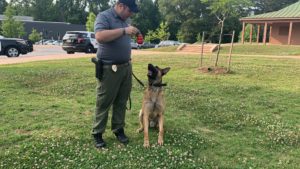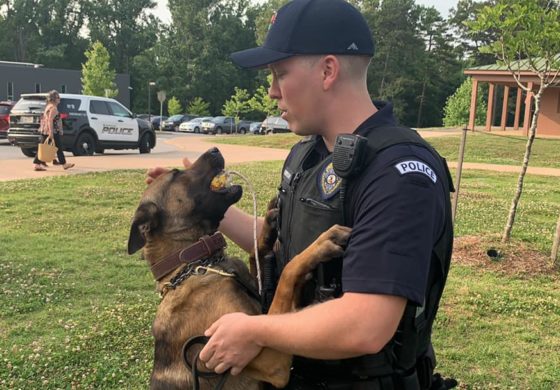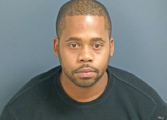By Madeline Otten, correspondent
Two new K-9 officers completed their training in May at Fluvanna’s Rivanna K-9 Services and are now working with the Charlottesville Police.

Corporal Chris Huber with K-9 Kai. Photo courtesy of the Charlottesville Police Department.
Bono, who is two and a half, and Kai, almost two, are both Belgian Malinois dogs that came from the Netherlands. The dogs are half-brothers, sharing the same father, and their breed is considered a working dog to assist in searches, narcotics and explosives. Belgian Shepherds, Dutch Shepherds, German Shepherds and mixes of these breeds have proven to be the most suited for law enforcement and military work. This breed is also trained in criminal apprehension so that they can perform building or area searches for dangerous criminals.
Bono, Kai and their handlers, Officer James Tennyson and Corporal Chris Huber, trained for 12 weeks with Armin Winkler at Rivanna K-9 Services. They encountered initiative training concepts, tactical solutions and decoy, and attended seminars. They also continue to have a group training day every two weeks.
“We select K-9 candidates, evaluate them as to their suitability and prior training, and also their unique personalities,” said Winkler. “From there we match them with the handlers selected by the departments or agencies, and after we train daily to teach the skills the teams need to serve the community.”
During one of the training sessions, Huber and Tennyson had to learn how to be a decoy for the other dogs in the training group – and that meant getting used to being in the bite suit. While a bite suit might sound protective, the handlers must catch the dog correctly to avoid injury not only to themselves but also to the dogs.
“We have to learn how to read the dog, adjust movements to help, and learn about canine behaviors and drives – such as prey, hunt and defense drive – to help us better understand them,” said Huber. “It is important that we also keep up with court rulings that dictate K-9 usage. We need to have a good understanding of the Constitution, specifically Fourth Amendment search and seizure.”
The training does not end there. Handlers and dogs take advantage of any down time during patrol shifts to train some more.
What makes these dogs so important to the law enforcement team is their nose. Most people know that dogs have a great sense of smell, but Huber described it more specifically. While humans can walk into a room and smell chicken noodle soup, he said, Kai and Bono can smell the soup, spices and other ingredients that are cooked with it. Since their sense of smell is much more enhanced than that of humans, the dogs can help take dangerous drugs off the streets and can be used to track down suspects.
Even though these dogs are put to work in intense situations, they are just like any other dog in that they want affection and fun.
“They enjoy their jobs and love the working aspect of it, but also know how to turn that component off and just have fun and play with their toys like any other dog,” said Huber.
“Their end goal for the day is go home, have fun, and do whatever they need to do to get their toys,” Tennyson added.
Now that Kai and Bono have joined the Charlottesville Police Department, there are three K-9 units spread across three shifts to assist on calls when requested. A fourth dog is in training at Rivanna K-9 Services for explosives detection. It is set to graduate in August and will help the Charlottesville Police Department increase security and safety for the city.
Rivanna K-9 Services is located right off Route 608 near Courthouse Road in Palmyra. Winkler said he was looking for a place to settle with his family in 2001, and Fluvanna County felt like a place they could call home.
Winkler grew up training dogs in Europe. He continued his love by earning his diploma in dog training for law enforcement. According to his website, he is listed as a certified instructor through the Justice Institute of British Columbia and Department of Criminal Justice Service.
Winkler took his first step in his career in the mid-1970s in Ontario, Canada, where he owned and operated a K-9 security service that trained security dogs for the private sector and provided instruction regarding their use and deployment. Winkler then progressed into lecturing and instructing internationally on theoretical training concepts as well as hands-on real-life training.
“My wife and partner have also been training dogs since a very young age,” said Winkler. “We discovered over the years that we are blessed with a unique gift when it comes to understanding the K-9 mind. We combined that with extensive education and many years of experience to not only assist the men and women on the front lines, but also to enable us to do this job in humane and scientifically based methodologies that dogs respond to extremely well.”
Throughout his years working in the field, Winkler has had great success teaching specialty K-9 seminars and courses for military K-9 programs for the U.S. Army Special Operations Command, U.S. Rangers, U.S. Special Forces, U.S. Naval Special Warfare Development Group, the Brazil Navy and National Guard, the Royal Australian Air Force, Germany (KSK), and civilian law enforcement special operations programs, according to his website.
Though the law enforcement situations encountered may be similar between patrol officers and K-9 units, one major element makes a dog and handler stand out: companionship.
“We always have a partner and best friend with us,” said Huber. “Patrol officers in Charlottesville mostly work solo in the car, but these dogs truly are our best friends. They can read our emotions without us having to say anything. There is an unconditional bond between us that is extremely special and unique.”





